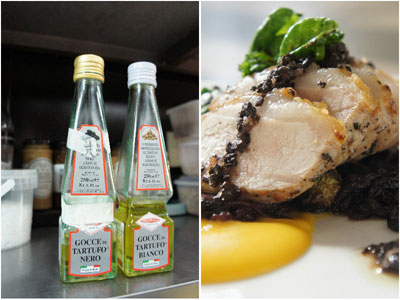The millionaire' s mushroom
|
|
|
Pork tenderloin. (Far left) The truffle oil Austin Hu uses in the kitchen. Photos: Shen Sijia |
|
|
|
Hu's sauce made with diced truffle, pepper, red wine vinegar and olive oil. |
They may not come cheap, but for many international chefs, truffles are something akin to the holy grail of cooking. "There is absolutely nothing to compare with the way they smell," said Madison Restaurant's executive chef Austin Hu of the fungus that are known as the "diamonds of the kitchen." "Black truffles, in particular have a deep, earthiness to them. Their taste reminds me of a wet, winter night - and I mean that in a good way. White ones are more luxurious, while the flavor of summer truffles has less impact than the other two."
According to Hu, the truffle is one of the "must-have components" of his restaurant's menu, in much the same way as fish sauce is vital to Thai cuisine, and saffron is important for many Spanish dishes.
Truffles from the best regions around the world cost anywhere between $35,000 to $50,000 per kilogram. And for their high-end status alone, many top-notch fine dining destinations in Shang-hai insist on using them in at least one of their recipes. Even the Cantonese-style restaurant Tan Wai Lou at Bund 18 and the Taiwanese-style Ding Tai Feng have created innovative dishes using the truffle: the Truffle Yellow Fish and the Truffle Dumpling, respectively.
The Global Times interviewed Hu and Tan Wai Lou's executive chef Tao Zhihai about the buying, storing and preparing of truffles - both at home and in restaurants.
The real thing?
Tao told Global Times that the truffles his kitchen uses are sourced in France, considered one of the world's top regions. "I've asked some Italian restaurants and not all of them are using truffles imported from the best regions in Europe," he said. "But even those truffles that are sourced domestically are of a very high quality."
Hu said that he is currently using black truffles from the Himalayas. After trying several varieties from China, he decided those from the Himalayas have a stronger flavor and aroma than those from Yunnan, for example. He also warned that buying truffles can be a risky business if you don't have a reliable supplier.
"It's easy to get tricked," he told the Global Times. "It's not like buying beef or pork where you can tell from the marbling how good the quality is. Truffles are a much tougher commodity to judge because when you receive them they are still dirty and caked in mud. You have to trust the person you are buying from. Many sellers will use low-grade varieties which they will spray with truffle oil making it very difficult to judge the quality."
For Tao, it is also a question of availability. "With truffles becoming more and more popular - especially in Asian markets - good truffles are becoming even harder to find. The demand is almost outstripping the supply," he said.
Keep them fresh
Even when stored properly, truffles have very a short shelf life; white truffles will keep for around five days, while black truffles last for anything up to 12 days.
However, there are differences in storage methods between Western and Chinese restaurants.
Hu, who trained as a chef in California, opts for the traditional way of storing truffles with eggs which, it is believed, absorb any excess humidity and keep the truffles moist. At the Madison they have a large container of eggs and truffles kept in a cold, damp corner of the kitchen (locked, naturally).
While in Tan Wai Lou, Chinese chefs achieve the same effect by storing the truffles with rice.
In an article in the New York Times, Daniel Patterson reported that many brands of so-called authentic truffle oil had been artificially flavored using a synthetic agent such as 2,4-dithiapentane. Hu said: "You can see from the bottle's label that it is actually truffle 'aroma,' 'essence' or 'flavor.' Only when it's labeled 'truffle olive oil', can you be certain it is derived from real truffles."
Even so, inferior truffle oil is still popular with chefs, because of its price.
 0
0 









